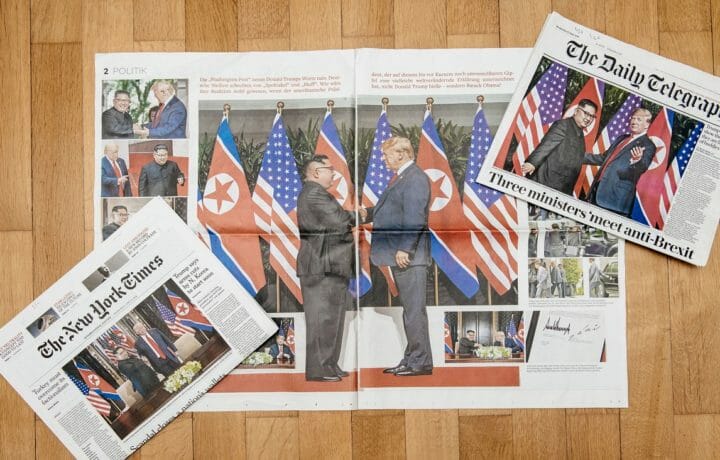While in Osaka, Japan for the G20 international economic cooperation summit, President Donald Trump made an impromptu trip to Panmunjom, North Korea to restart denuclearization talks with Chairman Kim Jon-un. After the Hermit Kingdom’s intransigence caused talks at the Hanoi Summit to fall apart in February, the leaders took this opportunity to jump-start the precarious U.S-DPRK relationship.
The U.S. and DPRK Hold Impromptu Nuclear Talks
On Sunday, with minimal planning, President Trump and North Korea’s Chairman Kim Jong-un met in Panmunjom, the site of the 1953 armistice that halted (but technically did not end) the Korean War.
The New York Times described North Korean security as being “particularly aggressive,” which likely prompted equally high vigilance on the part of the U.S. Secret Service. But it went smoothly. President Trump stepped across a low concrete divider, becoming the first sitting American president to visit the DPRK. He and Kim then spoke for nearly an hour inside the Freedom House conference center.
Are these Denuclearization talks worthwhile?
Still, the question remains: will it do any good?
Since the North Korean rapprochement began before the 2018 winter Olympics, when the U.S. was aggressively pursuing a maximum pressure campaign against the DPRK, I placed very little faith in North Korea’s sincerity. But the worst-case scenarios I envisioned never materialized, and the President sat down with Kim twice.
The young Korean leader is still solidifying his power. I remain convinced that Kim is trapped; he wants better relations with both the U.S. and the South Koreans, but his bureaucracy—his own “deep state”—opposes it. Perhaps having the American president visit the DPRK will be the catalyst needed to restart serious negotiations.
There were rumors after the failed Hanoi summit that the two top Korean negotiators, intelligence chief Kim Yong Chol and his deputy, Kim Hyok Chol, had been “purged” from public life and that Kim Yong Chol might even be in a labor camp.
This was all too easy to believe. After all, Kim had his own brother killed with nerve agent in a Malaysian airport. It was also, at the very least, an exaggeration (this time). Kim Yong Chol appeared in public at an event with the chairman just days after the South Korean press published the rumors. But has the chairman convinced the general to represent his views, and not the bureaucracy’s, at the negotiating table?
What’s next for denuclearization talks? It’s anyone’s guess
What happens next is anyone’s guess. Few would have predicted that his gestures of friendship in 2018 would have lasted more than the length of the Olympic games.
Many observers believe Kim was genuinely surprised when the American team walked away from the table at Hanoi. For that, he can blame the hardliners who refused to make any progress at the working group level. At the very least, the White House’s quick detour to the DMZ seems to have reignited Kim’s desire to get those talks moving again.
“This has a lot of significance because it means that we want to bring an end to the unpleasant past and try to create a new future,” he said.
He’ll have to give clearer instructions to the team, though, that not everything can happen at the ministerial and presidential level. At some point, diplomats must be diplomats and do the serious work for which they’re paid.
Handshakes might work in the short term, but nothing says “I want peace on the Korean peninsula” like a signed and ratified treaty that guarantees complete, verifiable, and irreversible denuclearization.




